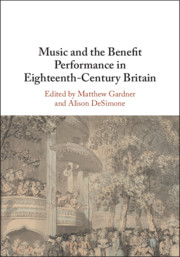Book contents
- Music and the Benefit Performance in Eighteenth-Century Britain
- Music and the Benefit Performance in Eighteenth-Century Britain
- Copyright page
- Contents
- Figures
- Tables
- Music Examples
- Notes on Contributors
- Acknowledgements
- Abbreviations
- Introduction
- Part I Musical Benefits in the London Theatre: Networks and Repertories
- Part II Beyond London: Mimicry or Originality?
- Part III Benefits and Public Image
- Part IV Charity Benefits
- 9 The Mercer’s Hospital Charity Services: Music and Charity in Eighteenth-Century Dublin
- 10 English Oratorio and Charity Benefits in Mid-Eighteenth-Century London
- Part V The Role of the Audience
- Select Bibliography
- Index of Musical Works
- General Index
10 - English Oratorio and Charity Benefits in Mid-Eighteenth-Century London
from Part IV - Charity Benefits
Published online by Cambridge University Press: 30 October 2019
- Music and the Benefit Performance in Eighteenth-Century Britain
- Music and the Benefit Performance in Eighteenth-Century Britain
- Copyright page
- Contents
- Figures
- Tables
- Music Examples
- Notes on Contributors
- Acknowledgements
- Abbreviations
- Introduction
- Part I Musical Benefits in the London Theatre: Networks and Repertories
- Part II Beyond London: Mimicry or Originality?
- Part III Benefits and Public Image
- Part IV Charity Benefits
- 9 The Mercer’s Hospital Charity Services: Music and Charity in Eighteenth-Century Dublin
- 10 English Oratorio and Charity Benefits in Mid-Eighteenth-Century London
- Part V The Role of the Audience
- Select Bibliography
- Index of Musical Works
- General Index
Summary
This article traces benefit performances of English oratorios by Handel, his contemporaries, and his successors between 1732 and the 1770s, exploring how the performances contributed to the success and popularity of English oratorio, as well as to question their strategic employment by composers and theatre managers. The relationship between criticism of oratorio performances in the theatre and the success they achieved through charitable association, particularly as a result of the Foundling Hospital performance of Messiah in 1750, will also be explored, offering new insights into the development of the genre and the practical uses of benefit nights in the mid-eighteenth century.
- Type
- Chapter
- Information
- Music and the Benefit Performance in Eighteenth-Century Britain , pp. 202 - 220Publisher: Cambridge University PressPrint publication year: 2019

